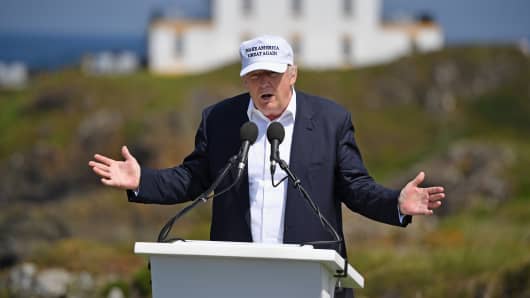With his extraordinary showman's sense of atmospherics and timing, Donald Trump jets into Scotland just as the Brexit vote is announced and, against the backdrop of his own lavish golf resort, proclaims victory, of a kind, to the kindred spirits in the U.K. who have voted to cast off their elites.
It's a brilliant counterpoint to a tough couple of weeks for Mr. Trump. His fundraising numbers are shockingly low and he's been plummeting in the polls. His sudden termination of Corey Lewandowski, his controversial campaign manager, suggests that he is well aware that his successful primary strategy won't work in November.
While the specifics of the Trump campaign are always entertaining, his big problem is that the general election is shaping up to be a referendum on Donald Trump. For a candidate whose unfavorable ratings have hit 70 percent in some polls, such a referendum is deadly. No matter how committed Trump's die hard supporters may be, voters who dislike him will support him only if they like Hillary Clinton even less. His strategy should be clear: focus less on himself and more on his opponent.
This week, in the most memorable line of his most scripted speech to date, Trump did exactly that: "Her campaign slogan is 'I'm with her.' You know what my response to that is? I'm with you: the American people."
That approach marks a sharp contrast to his first reaction to the Orlando shooting:
"Appreciate the congrats for being right on radical Islamic terrorism…"
That self-centered tweet destroyed what should have been a boon to the Trump campaign. President Obama's steadfast refusal to acknowledge the attack as radical Islamic terrorism seemed tailor-made to increase support for Trump.
Much as it's popular to condemn negative campaigning, it seems to be the wisest strategy for both sides in a race between candidates with disapproval ratings in record territory. Clinton will win if she can keep voters focused on how much they dislike Trump.
For Trump to win, he must keep voters focused on how much they dislike Clinton, Obama, progressive governance, or some combination thereof. Under normal circumstances, it shouldn't be tough to focus voters on an outgoing two-term incumbent who has always polled as more popular than his policies and his unloved successor. Present circumstances, however, are far from normal. Donald Trump, perhaps above all else, likes to be the center of attention. To win, Trump must thus demonstrate (or develop) a political talent that we have yet to see: deflecting attention. His scripted speech might have been a first glimpse.
A typical Republican would have little difficulty focusing on Obama, a transformative President who has reoriented American foreign policy, regulatory economics, and social trajectory in a decidedly progressive direction. Those transformations, however, are still tentative. Clinton and the Democrats seek to entrench them; the Republicans and Trump to reverse them.
The proper question for the next five months is: Do you want America to become a progressive nation? Or would you prefer to return to a more traditionally American path? Given that most Americans are far less than fully progressive, that focus should benefit Republicans at the polls.
On foreign policy, most Americans understand that American leadership has been good for the world—and great for America. Progressives believe that American forces have blundered around the world, imposing our will and oppressing indigenous people. They seek to weaken our military while strengthening anti-American forces like Iran and Cuba.
Do Americans agree with the progressive decimation of our military and the empowerment of our enemies?
On regulatory economics, Obama has expanded the reach of the regulatory state to restructure any industry that runs afoul of progressive priorities. He has already garbled health care, destroyed coal, and kneecapped oil and gas. His FCC—after many tries—appears to have swallowed the Internet, in no small part because Harry Reid helped him pack the Court of Appeals for the DC Circuit, the court with the most important voice on administrative and regulatory law.
Do Americans want unelected bureaucrats, rather than the market, to determine which companies and industries succeed and which fail?
On the nation's social trajectory, Attorneys General Holder and Lynch have bullied universities, companies, and individuals into adopting the kaleidoscopic social norms of the progressive movement by threatening to cut off federal funding, deny government contracts, or bring civil rights lawsuits against those professing traditional social attitudes.
Do Americans want the federal government to dictate how we relate to sex and God?
This last point may represent Trump's greatest appeal to libertarians whose concern over moral policing previously led them to shun the GOP. They are far more likely to embrace Trump and Republicans in 2016 than the increasingly aggressive nanny-state.
In short, a traditional Republican candidate would keep the campaign focused on progressivism. A traditional Democratic candidate would try to deflect the attention to the Republican. Hillary Clinton will play that traditional Democratic game.
Odds are that Donald Trump will lose the election if he is the center of attention, and win if he can fade into the background. He seems to realize it, but the change won't be easy. How he handles the Brexit opportunity – ham-handedly like Orlando or deftly like his recent policy speech – is the early indicator of whether he has the discipline to win. It may be the greatest challenge he has ever faced.



